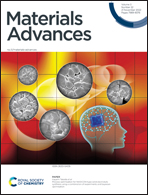Hybrid organic–inorganic perovskites as microwave radiation switches†
Abstract
Hybrid organic–inorganic perovskites are an intensively growing class of functional materials that attract much attention due to their various practical and important functionalities. In this paper, we show the ability of two hybrid perovskites, namely CH3NH3PbI3 and (C5H11NH3)2PbI4, to act as phase transition (PT) microwave switches. Microwave switching was studied as a consequence of PTs which occur at technologically attractive temperatures – slightly above room temperature: 330 K for CH3NH3PbI3 and 320 K for (C5H11NH3)2PbI4. It was found that, at selected frequencies, (C5H11NH3)2PbI4 is characterized by a very high transmission value of −0.4 dB which changes to −4.4 dB upon transition to a high-temperature phase. On the contrary, the transmission of CH3NH3PbI3 at room temperature is deficient (−25 dB) and increases just slightly upon transformation into a high-temperature phase. The microwave absorption changes by 38% for (C5H11NH3)2PbI4 and by 0.6% for CH3NH3PbI3 at selected frequencies. Notably, absorption in (C5H11NH3)2PbI4 changes from 9.9% at room temperature to 48.2% above the temperature of the PT, which is a five-fold increase. Our measurements show that CH3NH3PbI3 is rather suitable for application as microwave absorber, while (C5H11NH3)2PbI4 can be efficiently used as an active material in microwave switches.



 Please wait while we load your content...
Please wait while we load your content...